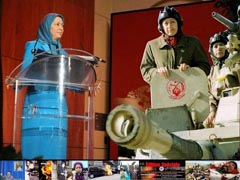Families of the Iranian victims of terrorism condemned the French lawmakers for allowing the 
The Habilian Association, a human rights group formed of the families of 17,000 Iranian terror victims, sent a letter of protest to the French Parliament, reiterating that the MKO is a group with dictatorial structure which is at odds with democracy.
"The MKO not only is undemocratic, but also has a complete autocratic structure which is at war with manifestations of democracy. The blast in Islamic Republic Party on June 27, 1981 is a clear example in this regard," the letter wrote. 
The Habilian Association referred to the MKO terrorist attacks which have claimed the lives of 12,000 Iranians so far, including the murder and assassination of dozens of parliament members, and asked whether such a group which has never expressed regret over its terrorist operations in the past can introduce itself as a supporter of democracy?
French lawmakers invited Rajavi last Wednesday in a move to give credibility to the terrorist group.
Speaking to the members of a French parliamentary committee on Iran, Rajavi hailed the western sanctions imposed against Iran over the country’s civilian nuclear program, and claimed, "International sanctions are positive steps. But they will only be effective if the West changes its policy vis-à-vis the resistance."
The MKO is behind a slew of assassinations and bombings inside Iran, a number of EU parliamentarians said in a recent letter in which they slammed a British court decision to remove the MKO from the British terror list. The EU officials also added that the group has no public support within Iran because of their role in helping Saddam Hussein in the Iraqi imposed war on Iran (1980-1988).
Many of the MKO members abandoned the terrorist organization while most of those still remaining in the grouplet are said to be willing to quit but are under pressure and torture not to do so.
A Human Rights Watch report accused the MKO of running prison camps in Iraq and committing human rights violations.
According to the Human Rights Watch report, the outlawed group puts defectors under torture and jail terms.
The group, founded in the 1960s, blended elements of Islamism and Stalinism and participated in the overthrow of the US-backed Shah of Iran in 1979. Ahead of the revolution, the MKO conducted attacks and assassinations against both Iranian and Western targets.
The group started assassination of the citizens and officials after the revolution in a bid to take control of the newly established Islamic Republic. It killed several of Iran’s new leaders in the early years after the revolution, including the then President, Mohammad Ali Rajayee, Prime Minister, Mohammad Javad Bahonar and the Judiciary Chief, Mohammad Hossein Beheshti who were killed in bomb attacks by MKO members in 1981.
The group fled to Iraq in 1986, where it was protected by Saddam Hussein and where it helped the Iraqi dictator suppress Shiite and Kurd uprisings in the country.
The terrorist group joined Saddam’s army during the Iraqi imposed war on Iran (1980-1988) and helped Saddam and killed thousands of Iranian civilians and soldiers during the US-backed Iraqi imposed war on Iran.
Since the 2003 US invasion of Iraq, the group, which now adheres to a pro-free-market philosophy, has been strongly backed by neo-conservatives in the United States, who argued for the MKO to be taken off the US terror list.
The US formally removed the MKO from its list of terror organizations in early September, one week after Secretary of State Hillary Clinton sent the US Congress a classified communication about the move. The decision made by Clinton enabled the group to have its assets under US jurisdiction unfrozen and do business with American entities, the State Department said in a statement at the time.


